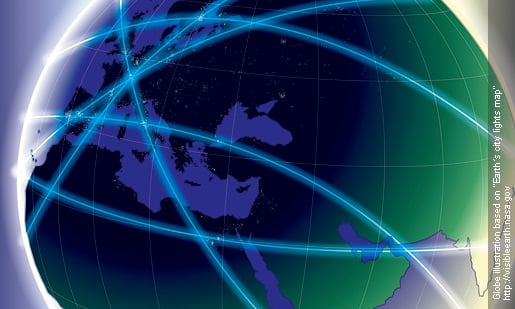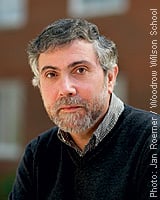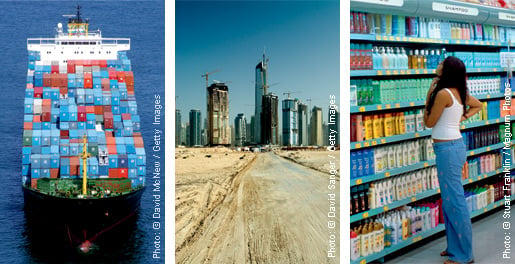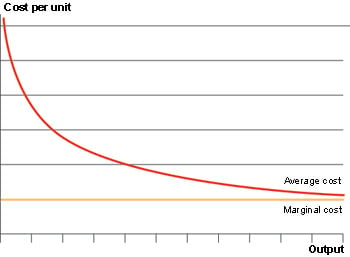Illustrated Presentation
Contents
Small world – big cities
Paul Krugman
Trade and geography
Further reading
Credits
The Royal Swedish Academy of Sciences has decided to award the Sveriges Riksbank Prize in Economic Sciences in Memory of Alfred Nobel for 2008 to Paul Krugman “for his analysis of trade patterns and location of economic activity”.

Small World – Big Cities
What are the consequences of free trade and globalization? What are the forces driving worldwide urbanization? Such questions have long been central to research in both economics and geography. The answers provided by traditional theories, however, have not been sufficient to explain real-world trade patterns. Paul Krugman has developed a new theory that helps us understand both the rapid growth of world trade and the increasing concentration of economic activities to cities.

Paul Krugman
was born in 1953, and is Professor of Economics at Princeton University in the United States. Around 1980, he began publishing several ground breaking papers on trade theory. His most important contributions to economic geography were published in the early 1990s. He is also well known for his economics textbooks and for his commentary on current economic affairs.

Trade and geography
Traditional theory builds on the idea that countries differ in resources like capital and labour, thereby explaining why poor countries export agricultural products and import industrial goods from richer countries. But traditional theory does not explain why, in reality, world trade is dominated by rich countries trading similar goods with each other. For instance, a country like Sweden exports Volvo and SAAB cars but also imports BMW and Toyota cars.
Krugman’s ideas can explain these trade patterns. His theory stresses the importance of “economies of scale”, the fact that many goods can be produced more cheaply in long series. The diagram shows how the average cost declines as fixed costs like research and development are absorbed by larger volumes.

Consumers like variety. Some might prefer simple, generic jeans, for example, while others search out exclusive designer clothes. Because of these demands, small scale producers catering for local markets are often transformed into large firms exporting to the world market, where firms with similar products, but different brands, compete with each other. Worldwide trading allows firms to specialize and to exploit economies of scale. This leads to lower prices and more product variety for consumers.
Economies of scale may lead to rapid urbanization. Since 2007, for the first time in history, more than half of the world’s population live in cities. Paul Krugman has shown how economies of scale along with falling transportation costs can trigger a self-reinforcing process whereby a growing urban population gives rise to more large-scale production, higher real wages and a more diversified supply of goods. This, in turn, stimulates further migration to cities. The end result may well be that regions become divided into an urbanized core and a less developed “periphery”.
Further reading |
| Information about the Prize in Economic Sciences 2008: www.kva.se, http://nobelprize.org, www.nobelmuseum.se |
| Increasing Returns, Monopolistic Competition, and International Trade, P. Krugman, Journal of International Economics 9: 469–479, 1979 |
| Scale Economies, Product Differentiation, and the Pattern of Trade, P. Krugman, American Economic Review 70: 950–959, 1980 |
| Increasing Returns and Economic Geography, P. Krugman, Journal of Political Economy 99: 483–499, 1991 |
| Geography and Trade, P. Krugman, MIT Press, Cambridge, MA. 85 pp, 2000 |
| International Economics: Theory and Policy, P. Krugman and M. Obstfeld, 8th edition, Pearson. Ch 6–7, 712 pp, 2009 |
| The Conscience of a Liberal http://krugman.blogs.nytimes.com |
Credits and references for the 2008 Poster for Economics
Editors: Bertil Holmlund, Peter Englund and Mats Persson, the Committee for the Prize in Economic Sciences, the Royal Swedish Academy of Sciences, Erik Huss, Annika Moberg and Andrea Westerdahl, the Royal Swedish Academy of Sciences.
Layout and illustrations: Typoform
Printed by AlfaPrint AB 2008
Copyright © 2008 The Royal Swedish Academy of Sciences
Box 50005, SE-104 05 Stockholm, Sweden
Phone:+46 8 673 95 00, fax: +46 8 15 56 70
e-mail: [email protected], www.kva.se
Posters may be ordered free of charge by phone, fax or e-mail.
Web adapted version: Nobelprize.org
Economics Poster from the Royal Swedish Academy of Sciences, web adapted by Nobel Web
